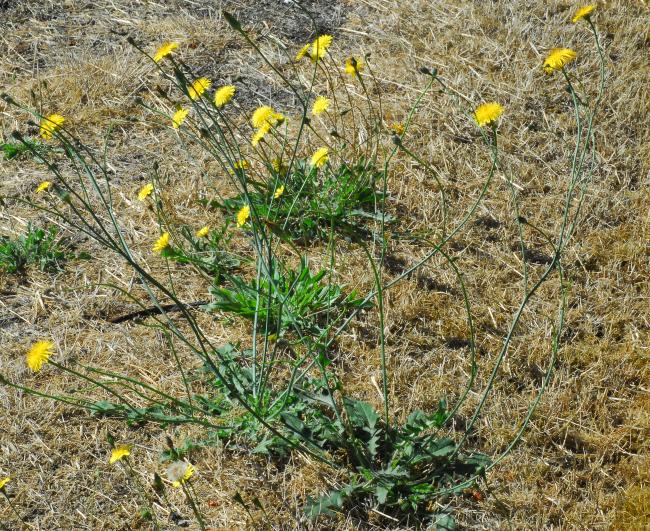Hypochaeris radicata L.
Spotted Cat's Ear

Introduced
CC = *
CW = 5
MOC = 7
© SRTurner
Hypochaeris radicata L.Spotted Cat's Ear | |
 |
Introduced CC = * CW = 5 MOC = 7 |
© SRTurner |
|
Family - Asteraceae/Cichorieae Habit - Perennial forb, with a thickened, vertical rootstock and 1 or few often thickened main roots. Latex white.
Stem - Single or more commonly few to numerous, laxly ascending to weakly erect, to 60 cm, usually few-branched above the midpoint, finely longitudinally ridged, glabrous or sparsely to moderately pubescent with white, somewhat spreading hairs, these often somewhat flattened and gradually expanded at the base.
Leaves - Basal and alternate, the stem leaves much-reduced and mostly scalelike. Basal leaves sessile or with a short, winged petiole. Leaf blades 3-35 cm long, narrowly oblong to oblanceolate, ranging from pinnately several-lobed with bluntly triangular to oblong- rounded lobes and rounded sinuses to unlobed but with few to several broad, shallow, spreading teeth, both surfaces moderately to densely pubescent with relatively coarse, white, spreading hairs. Venation of 1 main vein and sometimes very faint, arching secondary veins.
Inflorescences - Solitary heads at branch tips, long-stalked. Heads - Involucre 10-15 mm long at flowering, elongating to 17-25 mm at fruiting, cup-shaped to broadly cylindrical, the bracts mostly 20-28 in 4-6 overlapping series, ovate to narrowly oblong-lanceolate, glabrous or sparsely to moderately hairy along the midnerve, green, the margins often thin and pale, the tip appressed-ascending, often with a minute fringe of hairs, sometimes purplish-tinged. Receptacle with a chaffy bract wrapped around the base of each floret, these usually extending just past the pappus at flowering and elongating as the fruits mature, very narrowly triangular, white, papery.
Florets - Disk florets absent. Ligulate florets 25-55. Corollas 10-16 mm long, bright yellow, occasionally somewhat grayish- or lavender-tinged on the outer surface. Pappus 10-12 mm long, of numerous bristles, the outer series shorter and finely barbed, the others longer and plumose, straw-colored, persistent at fruiting.
Fruits - Achenes 8-15 mm long (including the beak), the body narrowly oblong-elliptic in outline, not flattened, 10-14-ribbed, tapered at the tip to a slender beak about as long as the body, the pappus attached to the expanded, disclike tip, the surface roughened with minute, ascending tubercles or barbs, otherwise glabrous, brown to reddish brown.
Flowering - May - August. Habitat - Lawns, roadsides, railroads, open disturbed areas. Origin - Native to Eurasia. Lookalikes - Numerous other members of the Cichorieae tribe, including species of Sonchus, Pyrrhopappus, Taraxacum, Krigia, Hieracium, and others. Other info. - This introduced relative to the dandelion is very common parts of the U.S., including the Pacific Northwest and New England states. It is uncommon in Missouri, known so far from only a few widely-scattered counties. The flowering heads look similar to those of several other plants including dandelions, but this species has long, solid, wiry stems bearing vestigal, scalelike leaves. Dandelions, in contrast, have hollow and completely naked stems. The basal leaves of Hypochaeris radicata are also distinctive, with rounded lobes and conspicuous hairiness and surface texture. Photographs taken in Marquette, MI., 9-8-03, and in Auburn, AL., 4-17-05 (DETenaglia); also along a roadside in Cowlitz County, WA, 8-27-2012, on Anderson Island, Pierce County, WA, 6-17-2015, near Loda Lake, Newaygo County, MI, 8-27-2020, in Newaygo, Newaygo County, MI, 7-05-2022, and near Fremont, Newaygo County, MI, 7-20-2022 (SRTurner). |